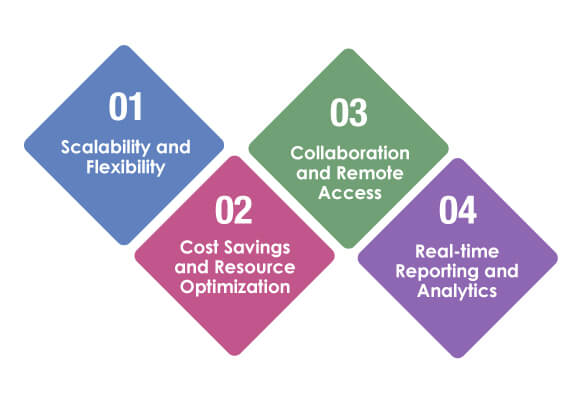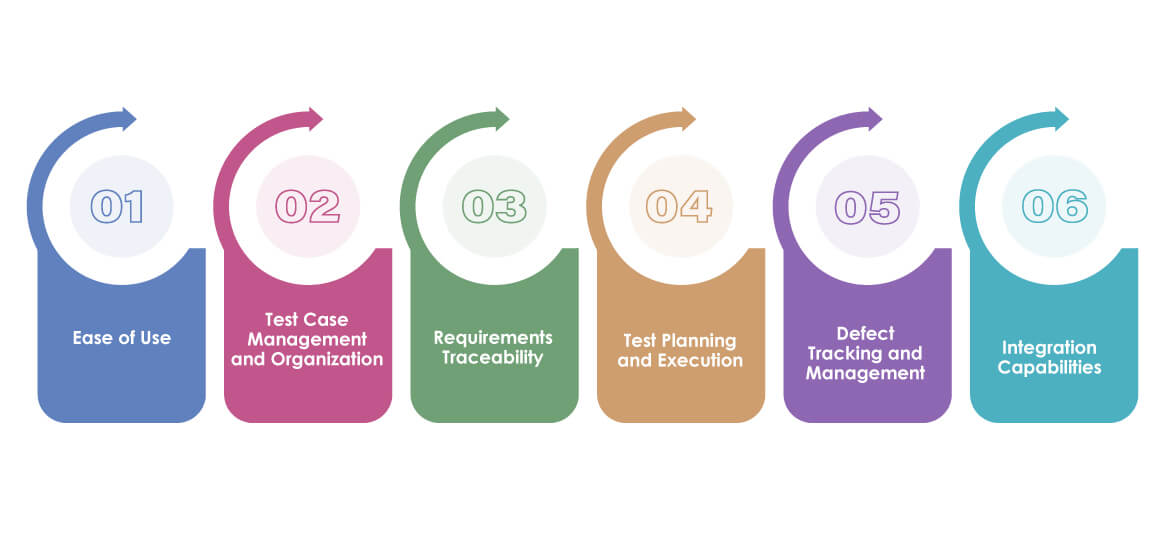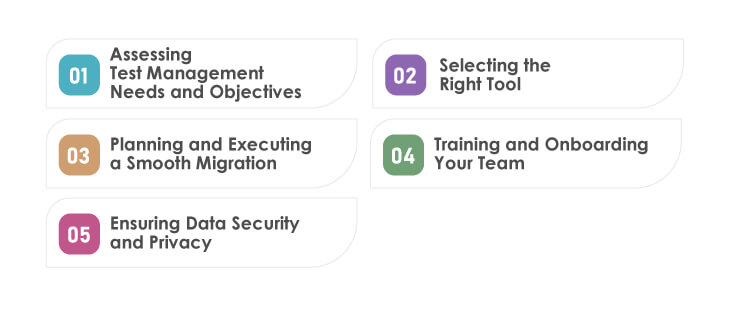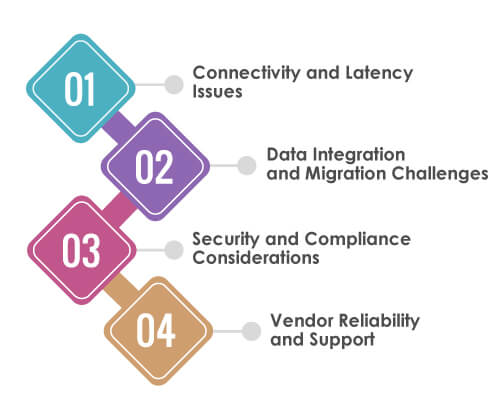Published: 25 Jul 2023
Leveraging Cloud-Based Test Management Tools for Seamless Testing
Last Updated: 29 Mar 2024
In today’s competitive business landscape, efficient test management is essential for successful testing. It involves organizing, planning, and executing tests while keeping track of requirements and defects. And because of cloud technology, test management has undergone a significant change, offering new possibilities and advantages.
Cloud-based test management tools are empowering organizations to streamline their testing processes and achieve seamless testing. By leveraging these tools, businesses can enjoy numerous benefits, such as improved scalability, cost savings, collaboration, and real-time reporting. According to a study, the global cloud-based test management market will grow at a compound annual growth rate of over 15% between 2021 and 2026, indicating a widespread recognition of their benefits.
Test Management Integration with the Cloud

Let’s first understand the concept of test management and its key components. Test management involves systematically planning, tracking, and controlling testing activities throughout the software development lifecycle. It encompasses test case management, requirements traceability, test planning and execution, and defect tracking as well as management.
Cloud-based test management solutions provide a centralized platform accessible via the Internet, enabling teams to manage their testing activities effectively. These solutions eliminate the need for on-premises infrastructure, software installation, and maintenance, offering a scalable and flexible environment for testing.
Benefits of Cloud-Based Test Management Tools

Cloud-based test management tools offer many benefits that revolutionize how organizations approach software testing:
Scalability and Flexibility:
Cloud-based test management tools provide the flexibility to scale testing resources up or down based on project requirements. Teams can quickly provision additional servers, virtual machines, or testing environments, ensuring optimal resource utilization and faster time-to-market.
Cost Savings and Resource Optimization:
Organizations can significantly reduce hardware and infrastructure costs by moving test management to the cloud. The pay-as-you-go model eliminates the need for upfront hardware, software licenses, and maintenance investments. Additionally, teams can optimize resource allocation by leveraging cloud resources on demand.
Collaboration and Remote Access:
Cloud-based test management tools enable geographically dispersed teams to collaborate seamlessly. Testers, developers, and stakeholders can access the testing environment from anywhere, facilitating real-time collaboration and efficient communication. This ensures that all team members are on the same page, regardless of their physical location.
Real-time Reporting and Analytics:
Cloud-based tools offer robust reporting and analytics capabilities, providing real-time insights into testing progress, test coverage, and defect trends. Test managers can generate customized reports, track key performance indicators, and make data-driven decisions to improve testing efficiency and quality.
Key Features to Look for in Cloud-based Test Management Tools

When selecting a cloud-based test management tool, several key features should be considered to ensure seamless testing:
Ease of Use:
The tool should have a user-friendly interface and intuitive workflows to facilitate seamless usage. It should be easy to navigate, allowing users to locate and access the required features and functions quickly. A clean and well-organized design with logical menus, icons, and labels can significantly reduce the learning curve for new users and enhance overall usability.
Test Case Management and Organization:
The tool should offer comprehensive test case management features, including the ability to create, organize, and execute test cases efficiently. It should support test case versioning, test prioritization, and easy maintenance.
Requirements Traceability:
A good test management tool should enable traceability between test cases and requirements, ensuring that corresponding test cases cover all functional and non-functional requirements. This helps in validating the application’s compliance with the desired specifications.
Test Planning and Execution:
The tool should facilitate test planning, including test estimation, scheduling, and assignment of test cases to team members. It should provide an intuitive interface for executing tests, capturing test results, and managing test cycles.
Defect Tracking and Management:
Effective defect tracking is vital for maintaining a structured approach to resolving issues. The tool should provide a centralized defect repository, support workflows for defect management, and enable seamless collaboration between testers, developers, and stakeholders.
Integration Capabilities:
Integration with other software development and testing tools is crucial for streamlined workflows. The test management tool should integrate seamlessly with popular bug-tracking systems, version control tools, and continuous integration/continuous delivery (CI/CD) pipelines.
Popular Cloud-based Test Management Tools in the Market

Several cloud-based test management tools have gained popularity, each offering unique features and benefits. Let’s take a brief look at three prominent tools:
XQual
XQual is a cloud-based test management tool that caters to the diverse needs of software testing teams. It offers a user-friendly interface and many features, including test case management, requirements traceability, test planning, execution, and defect tracking. Its intuitive dashboard gives stakeholders real-time visibility into testing progress, enabling informed decision-making. XQual integrates with other testing tools to create a connected ecosystem, promoting efficiency and productivity.
TestRail
TestRail is a widely recognized cloud-based test management tool trusted by organizations worldwide. It provides a comprehensive suite of features, including test case management, test run management, and test reporting. TestRail’s intuitive interface and user-friendly workflows make it easy for testers and stakeholders to collaborate effectively. It also seamlessly integrates with popular issue-tracking tools, enabling efficient defect management. With its robust reporting capabilities, TestRail provides in-depth insights into test coverage, execution status, and progress.
SpiraTest
SpiraTest is a comprehensive cloud-based test management tool that provides end-to-end support for the testing lifecycle. It offers features for requirements management, test case management, test execution, and defect tracking. SpiraTest’s robust reporting and analytics capabilities allow stakeholders to monitor project progress, track key testing metrics, and make data-driven decisions. With its integration capabilities, SpiraTest integrates with popular development and testing tools, creating a unified and efficient testing ecosystem.
QMetry
QMetry is a comprehensive cloud-based test management tool that enables agility and efficiency in software testing processes. It offers features for test case management, test planning, execution, and defect tracking. QMetry’s intuitive interface and easy-to-use workflows simplify test management tasks, allowing teams to focus on delivering high-quality software. With its robust reporting and analytics capabilities, QMetry gives stakeholders real-time visibility into testing progress and helps drive data-based decision-making.
JIRA with Xray Plugin
JIRA with the ‘Xray’ plugin is a popular cloud-based test management tool many organizations use for effective test management within their software development lifecycle. JIRA, originally known as an issue tracking and project management tool, becomes a comprehensive test management solution when integrated with the ‘Xray’ plugin.
Best Practices for Implementing Cloud-based Test Management

To successfully implement cloud-based test management, organizations should consider the following best practices:
Assessing Test Management Needs and Objectives:
Evaluate testing requirements, team size, and project goals. Identify the specific features and capabilities you need from a test management tool.
Selecting the Right Tool:
Conduct thorough research, compare different devices, and choose the one that aligns with your organization’s needs. Consider factors such as ease of use, scalability, integration capabilities, and customer support.
Planning and Executing a Smooth Migration:
Create a migration plan outlining moving your existing test management processes to the cloud. Ensure proper data backup and establish a seamless transition to minimize disruption.
Training and Onboarding Your Team:
Provide comprehensive training to your team members to ensure they understand the new test management tool and its functionalities. This will help maximize their productivity and minimize the learning curve.
Ensuring Data Security and Privacy:
Choose a reputable cloud service provider with robust security measures, including data encryption, access controls, and compliance certifications. Regularly monitor and update your security protocols to protect sensitive test data.
Overcoming Challenges in Cloud-based Test Management

While cloud-based test management offers numerous benefits, organizations may encounter particular challenges during implementation. Here are a few common challenges and recommendations to address them:
Connectivity and Latency Issues:
Ensure your team has a stable internet connection to access the cloud-based test management tool. Consider adopting offline testing capabilities or backup solutions to mitigate connectivity issues.
Data Integration and Migration Challenges:
Migrating existing test cases and data to the cloud can be complex. Plan the migration carefully, perform thorough testing after the migration, and ensure the integrity and accuracy of the migrated data.
Security and Compliance Considerations:
Prioritize data security and compliance with industry regulations. Choose a cloud service provider that meets the necessary security standards and implements access controls, encryption, and regular security audits.
Vendor Reliability and Support:
Select a reputable vendor that offers reliable service, prompt support, and regular updates. Consider their track record, customer reviews, and the company’s longevity in the market.
Conclusion
Cloud-based test management tools have revolutionized the way organizations conduct testing. With benefits like scalability, cost savings, collaboration, and real-time reporting, these tools enable seamless testing processes and improve overall software quality. By carefully selecting the right tool, organizations can unlock the full potential of cloud-based test management and drive success in their testing efforts.
How Can TestingXperts Help with Test Management for Your Business?

At TestingXperts, we understand the importance of effective test management in ensuring high-quality software. With our expertise in cloud-based test management tools and comprehensive testing services, we can help your business streamline its testing processes. Whether you need assistance selecting the right tool, migrating to the cloud, or optimizing your test management strategy, our experienced team is ready to support you.
What sets us apart from our competitors?
Comprehensive Test Management Suite
Our cloud-based test management services offer a comprehensive suite of features designed to address the diverse needs of modern software testing. From test case management and requirements traceability to test planning, execution, and defect tracking, our solution covers the entire testing lifecycle.
Scalability and Flexibility
We recognize that businesses evolve and grow, and so should their testing infrastructure. Our cloud-based test management services provide unparalleled scalability, allowing you to scale up or down based on your testing needs.
Integration Capabilities
Seamless integration is crucial for creating a cohesive testing ecosystem. Our cloud-based test management services offer robust integration capabilities with test automation framework, enabling you to connect our solution with your existing development, project management, and issue-tracking tools.
Advanced Reporting and Analytics
Data-driven decision-making is vital to optimizing testing processes. Our cloud-based test management services provide advanced reporting and analytics features that give real-time insights into your testing efforts. Monitor key metrics, track test progress, identify bottlenecks, and make informed decisions based on comprehensive and customizable reports.
Robust Security and Data Protection
Data security and privacy are of utmost importance in today’s digital landscape. We prioritize the safety and protection of your testing data. Our cloud-based test management services adhere to stringent security protocols and industry best practices. We employ robust encryption, access controls, and regular backups to safeguard your sensitive testing information.
Contact us today to learn more about how TestingXperts can help drive your testing success.